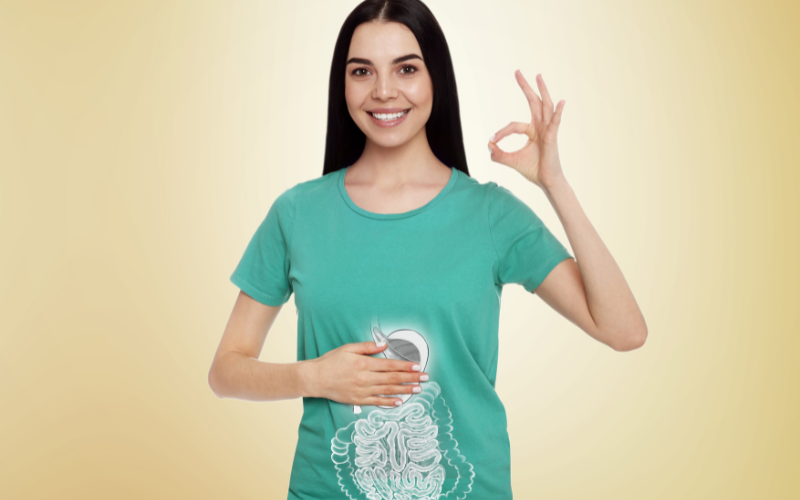Date
01.06.2024

There’s a lot of talk about gut health going on and for good reason!
Looking after your gut has a positive impact on pretty much all of the rest of your body including your mental health.
Your ‘gut microbiome’ consists of bacteria, viruses, and fungi residing in the gut. The ‘gut-brain axis’, that you’ve probably heard about, sends chemical messages between the gut and the brain which influences how you think and feel.
A healthy gut and balanced microbiome helps to:
strengthen your immune system
boost your energy levels
enhance absorption of nutrients from your food
make it easier to manage your weight
regulate moods, improve brain function and make you feel better!
HOW THE GUT WORKS
A little bit about how your gut works…. after we chew and swallow our food, it travels down our oesophagus and into the stomach where enzymes, acids and hormones are released to break down our food into smaller pieces.
From here our food passes into the small intestine where it is broken down further and the majority of the nutrients from our food are absorbed into our bloodstream and sent around the body to nourish our cells. AMAZING!
After this, the unabsorbed bits of food including dietary fibre, move into the large intestine. The large intestine houses the majority of our gut bacteria. These bacteria (microbes) feed on the undigested bits of food, producing messenger molecules that tell our brain when we have had enough to eat, as well as many other really important processes in our body.
There is a growing body of evidence linking healthy gut microbes with a lower risk of many diseases such as cancer, heart disease, liver disease, diabetes, asthma, depression, and irritable bowel syndrome.
TOP TIPS TO LOOK AFTER YOUR GUT
Firstly, it’s really important to chew your food well (like your Grandma probably told you!) to aid the digestion process - the body struggles to break down poorly chewed food which is a common reason some people experience excess bloating and gas after eating.
WHAT TO EAT
Wholefoods that are rich in fibre – vegetables, fruits, wholegrains, legumes, nuts and seeds
Fermented foods – plain yoghurt, tempeh, miso, kimchi, kefir and sauerkraut
Polyphenol-rich anti-inflammatory foods – berries, spinach, turmeric and green tea
Omega-3 fatty acids – oily fish such as salmon or sardines, walnuts, chia seeds
MANAGE STRESS
Have you ever had a "gut-wrenching" experience? This expression is used for a reason. The gut is very sensitive to emotion. Anger, anxiety, stress, sadness, excitement - all of these feelings can trigger symptoms in the gut. The brain has a direct effect on the stomach and intestines. This connection goes both ways. A troubled gut can send signals to the brain, just as a troubled brain can send signals to the gut.
Although it is normal and beneficial to feel a little stressed from time to time, frequent or debilitating stress can cause serious gut issues. There is a growing body of evidence that relaxation techniques such as diaphragmatic breathing can help reduce these stress-induced gut symptoms such as bloating, gas and discomfort. The Calm app or Headspace app are wonderful guides for learning to breathe diaphragmatically.
LIMIT ALCOHOL
Excess alcohol can damage the gut lining, making it harder for you to absorb certain nutrients from food while at the same time killing off both good and bad bacteria. Be sensible with alcohol. A little here and there is ok but it is best to stick to no more than 2 standard drinks per day, with at least 2 alcohol free days a week - here is what a standard drink looks like.
GUT ISSUES? Get checked!
If you have unusual gut symptoms such as bloating, excess gas, pain, constipation, and diarrhoea it can be a sign that something isn't quite right, or you may have an allergy/intolerance to certain foods. Talk to one of the team at Mission Nutrition about these symptoms, our Registered Nutritionists and Dietitians can help you optimise your gut health and see if you need any further tests or investigations. If you have health insurance, check your policy - you might be able to claim for the consultation too.
RELATED:
Food and mood My Breakfast TV interview about how to eat well to better your mental health, plus loads more resources included in this post that you might find helpful
Enough reading? Now, let’s make some good gut food…
Power up your porridge! Yes it is a carb rich food, but a damn good one, and carbs like this are not to be feared but embraced! They release energy slowly and are a fuel that your gut bacteria LOVE.
Sushi bowls with asian slaw Love sushi? Try this! A quick and easy mood-boosting meal that tastes absolutely delicious.
How to make kombucha Kombucha is a delicious fermented drink which is easy to make yourself and is low in sugar (the sugar you add is used up by the SCOBY during fermentation).
Enjoy!
01.06.2024
Claire Turnbull
Articles
Mission Nutrition Dietitians and Nutritionists © 2025.
Terms and Conditions